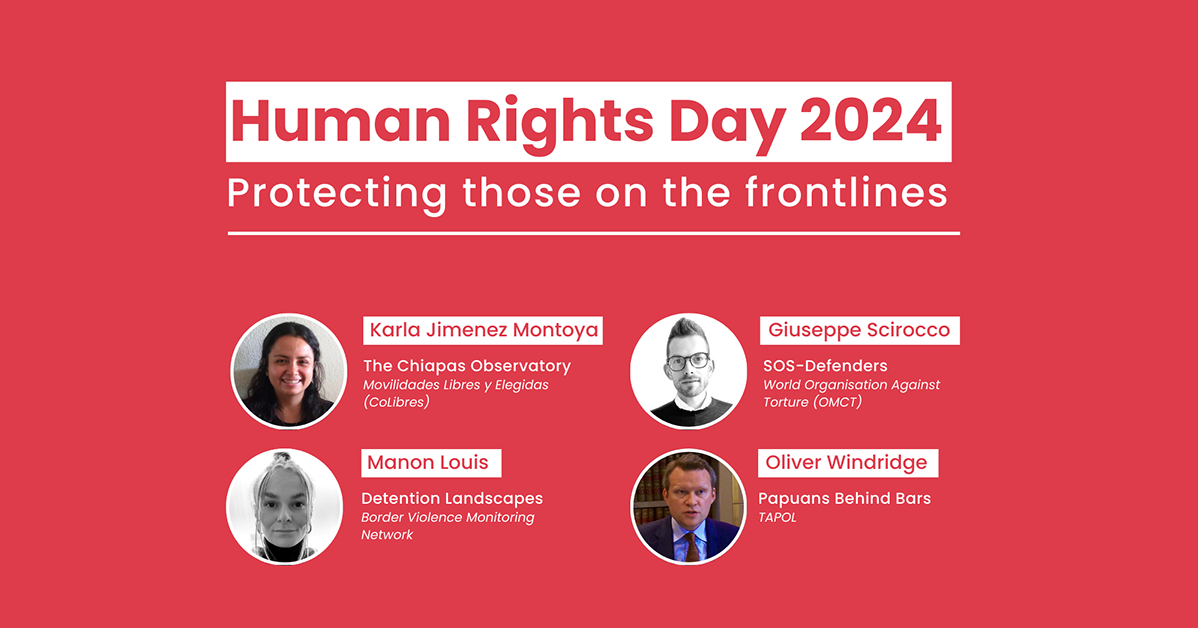On 10 December 2024, HURIDOCS hosted a webinar titled Protecting those on the frontlines, marking Human Rights Day with an exploration of the critical role that documentation and technology play in safeguarding human rights defenders who continue to face unrelenting threats. The event highlighted four initiatives led by human rights defenders from various regions, all supported by HURIDOCS. These projects emphasised the importance of collective action as vital responses to threats and as tools for advancing justice and liberation.
Karla Jiménez Montoya presented the work of 16 organisations that form the Chiapas Observatory, which documents in a currently private Uwazi instance, assaults and attacks against journalists and human rights defenders in the state of Chiapas, Mexico. Karla underscored the grave risks of human rights work in the region and emphasised the necessity of solidarity: “There’s no other option but to join forces to be able to document, visualise, and condemn the violence.” She highlighted the value of systems that respond to the unique realities and needs of human rights defenders, built through deliberate, collective efforts.
Giuseppe Scirocco introduced the SOS Defenders initiative, a secure database developed to address the glaring data gap regarding the arbitrary detention of human rights defenders. Giuseppe stressed that the growing criminalisation and targeting of defenders is no longer confined to specific countries or regions. The SOS Defenders platform provides vital visibility to defenders whose faces, stories, and cases often go unnoticed, aiming to rally local and international partners in advocating for their release and protection.
Manon Louis shared insights into the Detention Landscapes project, a collaborative effort between the University of Oxford’s Border Criminologies, Mobile Info Team, and the Border Violence Monitoring Network. The project maintains an interactive open-access database documenting human rights violations in immigration detention facilities, initially focused on Greece but now expanding to Turkey, Italy, and the UK. “We’ve managed to share the experiences of people who’ve been in detention in their own words,” Manon explained, emphasising the significance of victim-driven storytelling. The database serves as a living archive of testimonies, incident reports, open-source research, and visual evidence, bringing these violations to light.
Oliver Windridge spoke about TAPOL’s Papuans Behind Bars project, which documents political imprisonment in West Papua and supports campaigns to end the criminalisation of peaceful political activity. Through the use of Uwazi, Oliver noted, the team has identified gaps in their work, which has helped them refine their focus. “As much as it demonstrates and allows us to show a lot of data, it’s been invaluable to us as a small team to see where we need to be looking or asking questions for further information,” he shared.
The presentations were followed by a lively discussion during which Oliver noted the shared purpose of the four initiatives: “They are all bringing eyes and attention to situations that otherwise might not get the focus they deserve.”
Central to these projects is the rigorous collection and organisation of data, forming a foundation for advocacy, legal action, and public awareness. With tailored, open-source tools and collaborative engagements facilitated by HURIDOCS, these initiatives ensure their documentation is secure, accessible, and adaptable to the complexities they face. These projects showcase the power of global-local collaboration, uniting grassroots-led expertise with international support to confront shrinking civic space, resist threats to human rights work, and push for systemic change worldwide.
